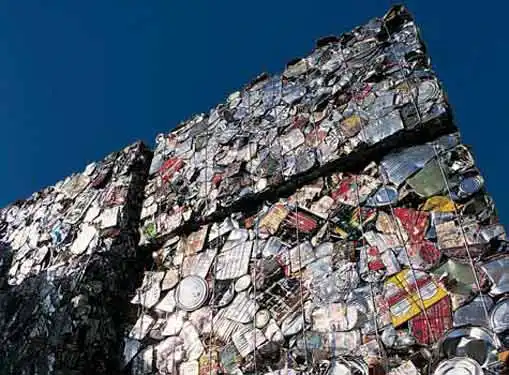Entrepreneur Guidance
How to Start a Metal Recycling Business
Opening a metal recycling business is your ticket to owning a good, stable business if you have the creativity and tenacity necessary to be a successful entrepreneur. Here is some nuts-and-bolts information that demystifies what it takes to be successful.
Thinking about opening a metal recycling business? We tell you what you need to know to get started.

Metal Recycling: Turning Trash Into Treasure
It might not be the most glamorous way to turn a profit, but business is booming in the metal recycling industry -- and entrepreneurs are increasingly venturing into metal recycling as a venue for successful small business ownership.
Driven by high demand for metals in China and other emerging economies, U.S. metal recyclers have seen the price of scrap more than double in recent years. With no sign that demand will decrease anytime soon, now is a great time for startup entrepreneurs to get into the game.
Metal recyclers collect, process, recycle and trade metal from a variety of sources. Most metal recycling aren't picky -- they barter in both ferrous (iron and steel) and non-ferrous (aluminum, copper, stainless steel, nickel, brass, etc.) metals.
Although some metal products require additional processing; others can be delivered directly to scrap metal recycling plants. Trade organizations like the Institute of Scrap Recycling Industries (IRSI) offer resources to help your startup maintain safe and environmentally friendly methods for the processing and handling scrap metal materials.
Expansion Strategies for Startup Metal Recyclers
It's never too soon to start thinking about how you can expand your metal recycling startup. In fact, your startup business plan should discuss future growth targets and the strategies you will use to accomplish them.
The key to a successful metal recycling business is to solidify relationships at both ends of the process: You need dependable scrap metal supply points as well as a metal recycling plant that pays fair prices.
- Supply Sources. The most common way for metal recycling to expand is to increase the types and volume of materials they handle. If you can expand your sources to include a wider range of metals (non-ferrous metals are worth more) and a higher volume of scrap, you're well on your way to bottom line growth.
- Recycling Plants. At the other end of the process, you may eventually want to consider expanding by launching your own recycling plant. Recycling plant startups have high capital requirements, but the rewards are increased control, better profit margins and the ability to create an additional revenue stream by processing metals for other recyclers.
Tips for Generating a Top Quality Metal Recycling Company Business Plan
A good business plan is the foundation of your entrepreneurial journey. Despite the diversity that exists in business plan writing, there are several essential elements that good business plans simply must include.
If you're unfamiliar with business plan essentials, you may want to think about purchasing business plan software. Robust software solutions incorporate best practices while streamlining the writing process, ensuring that your business plan reflects your company's commitment to quality.
Our list of business plan software packages offers a comprehensive guide to the best solutions on the market.
Investigate the Competition
Long before you open a metal recycling business in your town, it's a smart move to see how you will fit in the competitive landscape. Use the link below to generate a list of competitors near you. After clicking on the link, type in your city, state and zip code to get a list of metal recycling businesses near you.
Is the local market large enough to support another metal recycling business? If not, you had better be sure that you are doing things much better than the competition.
Talk to People Who Are Already in the Business
If you are interested in starting a metal recycling business, it's a smart move to speak with somebody who is already in the business. If you think your local competitors will give you advice, you're being overoptimistic. Why would they want to educate a future competitor?
Fortunately, somebody who runs a metal recycling business in a location that is not competitive to you will be much more likely to talk with you, provided that you won't be directly competing with them. Indeed, many experienced entrepreneurs enjoy offering advice to startup entrepreneurs. In my experience, you may have to call ten business owners in order to find one who is willing to share his wisdom with you.
What's the best way to find an entrepreneur who is running a metal recycling business in a different locale who can assist you?
Simple. Let your fingers do the walking by using the link below.
Why Buy a Metal Recycling Business?
As a rule, would-be startup owners are better off buying an existing metal recycling business. Yet many new entrepreneurs find it hard to resist the allure of a metal recycling business startup.
There are a lot of reasons why it makes sense to buy a business, but the most important reason may be capital. Commercial lenders are usually more inclined to fund acquisitions than startups.
At the risk of oversimplification, we think the idea of buying a business to get acquisition capital makes good business sense.
Is Franchising the Right Option?
Recognize that your chances of growing your business are much better if you become a franchisee and leverage their successful brand and track record.
If you planning on starting a metal recycling business, it's worthwhile to check out whether franchising might alleviate your startup process.
The link below gives you access to our franchise directory so you can see if there's a franchise opportunity for you. You might even find something that points you in a completely different direction.
More Advice for Startups
These additional resources regarding getting started as an entrepreneur may be of interest to you.
Share this article
Additional Resources for Entrepreneurs
